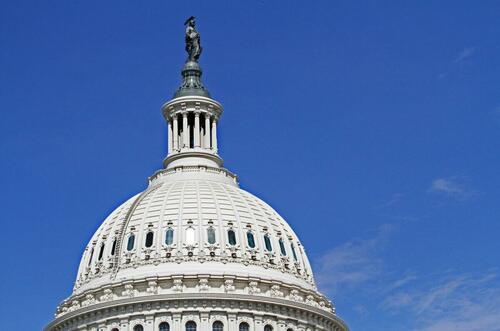US National Debt Hits All-Time High Of $32 Trillion
Authored by Mimi Nguyen Ly via The Epoch Times (emphasis ours),
The U.S. national debt has surpassed $32 trillion for the first time in U.S. history, Treasury Department data released on June 17 showed.
 The U.S. Capitol in Washington on March 23, 2023. (Richard Moore/The Epoch Times)
The U.S. Capitol in Washington on March 23, 2023. (Richard Moore/The Epoch Times)
The national debt as of June 16 is at an all-time high of $32.04 trillion, according to the Treasury’s daily statement (pdf).
This represents about $25 trillion in debt held by the public, and about $7 trillion in intragovernmental debt (pdf).
It comes less than two weeks after President Joe Biden signed into law the Fiscal Responsibility Act. One provision of the June 3 legislation suspends the debt ceiling for 19 months, which means the government can continue to borrow money until the end of 2024.
The debt limit was previously increased in December 2021 to $31.4 trillion.
On June 3, the total national debt was $31.47 trillion, but the business day immediately after Biden signed the bill, federal borrowing increased by nearly $400 billion.
The Congressional Budget Office projects the federal deficit for fiscal year 2023 to be $1.4 trillion.
Although the legislation Biden signed also included some $1.5 trillion in spending cuts over the next decade, under the Biden administration’s 2024 budget proposal, the gross national debt is projected to exceed $50 trillion by 2033.
That’s over $17 trillion over the next decade, which would be more than the entire national debt held by the public before COVID-19.
The federal government surpassed the $31 trillion mark on Oct. 2, 2022—just over eight months ago.
The $32 trillion mark was reached nine years sooner than what had been projected prior to the COVID-19 pandemic, largely due to trillions of dollars of congressionally-approved COVID-19-related spending.
‘Debt Addiction’
“We can’t even get through a single fiscal year anymore without adding a trillion dollars in debt, and $33 trillion is likely just around the corner,” Maya MacGuineas, president of the Committee for a Responsible Federal Budget, said in a statement.
“Our debt addiction saddles the next generation with a debt burden that only grows larger so long as we insist on ducking the hard choices of governing.
“We need a return to responsible fiscal policy if we’re ever going to get ourselves out of this mess. The formula to get there should be simple: no new borrowing—meaning fully offset all new spending or tax cuts—and better yet, hold off on them until our debt is under control; address the drivers of our runaway debt; and reform our broken budget process. It’s not rocket science—it’s pretty darn straightforward, and it’s time for our politicians to get to work before it’s too late.”
Read more here...
via IFTTT
InoreaderURL: SECONDARY LINK
